SAI Nepal Perspectives on Civil Society Participation in Performance Audits

Author: Maheshwar Kaphle, Deputy Auditor General, Office of the Auditor General of Nepal
Background: Performance Audit and Civil Society Participation
Performance audit aims to improve accountability and transparency while constructively promoting effective and efficient governance through recommendations for future improvement. Performance audits, often conducted by Supreme Audit Institution (SAI), hold those with governance and oversight responsibilities accountable and aim to improve their performance by examining the efficiency of decisions of the legislature or executive and whether tax payers or citizens have received value for how the government has used public resources. These audits also provide useful information to the public, while serving as a basis for future learning and improvements from lessons learned. Elements of performance audits may overlap with other audit types. Combined audits can also incorporate various performance, compliance, and financial auditing aspects.
Although the functions of SAI and Civil Society Organizations (CSOs) are different in nature, the relationship between SAI and CSOs is necessary for quality audit management. In participatory audit, civil society stakeholders (civil society organizations, academic groups, community members, and the private sector) contributes to various parts of the audit process, including the planning, execution, reporting and follow up of audit. Civil society engagement strengthens the auditing process through improving:
- Partnership building: A strong partnership between SAIs and civil society stakeholders will help establish the terms of engagement through a consultative and collaborative approach.
- Capacity development: Civil society engagement improves the capacity of primary stakeholders to undertake participatory audits with greater effectiveness.
- Public communication: An integrated communication plan with support from internal and external CSOs stakeholders can be designed to create awareness of the program and audit.
- Knowledge sharing: CSOs usually work on the grassroots level, and thus, have more information about local situations and circumstances. Sharing this information with SAI will benefit a quality audit. The combination of SAI audit staff experiences and information on public resource uses from the grassroots level to CSOs enhances the quality audit.
Office of the Auditor General of Nepal (OAGN) and Citizen Participation Audit (CPA)
The Office of the Auditor General of Nepal (OAGN) approved the Citizen Participation Audit (CPA) procedure in 2016. This procedure incorporates civil society partners into the audit process to provide primary sources of data or sector specific information and expertise; to monitor local activities; to establish communication mechanisms, and; to support and enhance accountability. CSOs can also provide input to possible topics for performance audits and submit issues in the annual audit plan, as approved by the Auditor General. Engaging CSOs in the performance audit process is beneficial, as CSOs may have more information on public resource use as they are directly involved in monitoring and evaluation of program implementation at local level. CSOs may also help to disseminate the results of the audit, and can assist with continuous monitoring the implementation of audit recommendations.
The process of CSO engagement in performance audit is defined in the approved procedure. According the CPA Procedure, CSOs that can participate in the audit process are institutions registered as per the law that are not-profit oriented, are not politically affiliated, and have the goal of enhancing civic awareness. Locally registered CSOs will have participatory priority and there must not be conflict of interest vis-a-vis the project. CSOs are required to abide by OAGN’s audit Code of Conduct, core values, and principles, and must be willing to engage without remuneration.
Although OAGN has statutory and primary auditing responsibility, selected CSOs can contribute at various parts of the auditing process. The CSOs may involve in the following audit cycle whereas the OAGN has decided:
- In the audit planning stage, CSOs may suggest subjects and issue areas for audit to OAGN through methods such as a joint meeting, formal request, public notice, etc.
- In the audit execution phase, CSOs help to make audit execution effective by assisting with the collection of relevant evidence and information. CSOs may participate in the verification of information, field observation, and inspection with OAGN audit team. CSOs may also share information and their views regarding the status of services provided by the entities to the audit team. The OAGN engages CSOs through focus group discussions, interviews, and questionnaires. CSOs may be involved in the audit procedure, but must follow the terms of reference and code of conduct stated in the audit plan, as well as guidance of the audit team.
- In the reporting stage, the audit team has the responsibility to prepare audit report with consultation or with due consideration of the information provided by the CSOs, and must verify this information in the audit execution.
- In the audit follow up stage, CSOs may provide support to the audit team for continuous follow up to monitor the implementation of audit findings, in cases where the Auditor General determines it necessary. CSOs may help to dissemination of the audit results.
As per the CPA procedure, CSOs must return all documents, information and other evidence to the OAGN’s audit team after the completion of engagement with a particular audit.
Audit results: Case Studies of performance audits with CSO participation.
The OAGN has conducted 12 performance audits in the year 2021. Out of these 12 audits, the OAGN has conducted 4 performance audits and an environment audit with the participation of CSOs. The audit objectives, scope, methodology, audit results and recommendations of these audits are as follows:
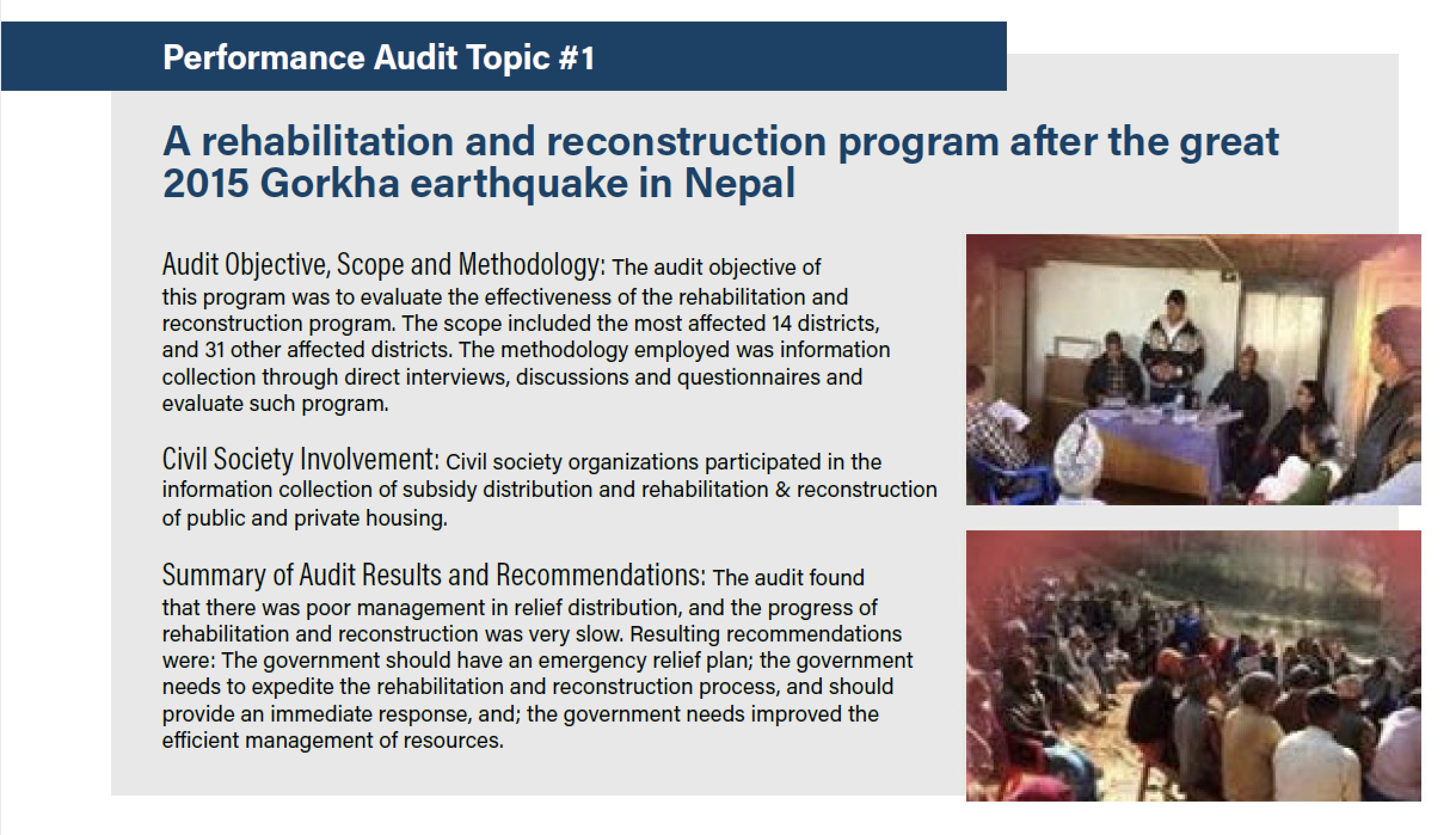
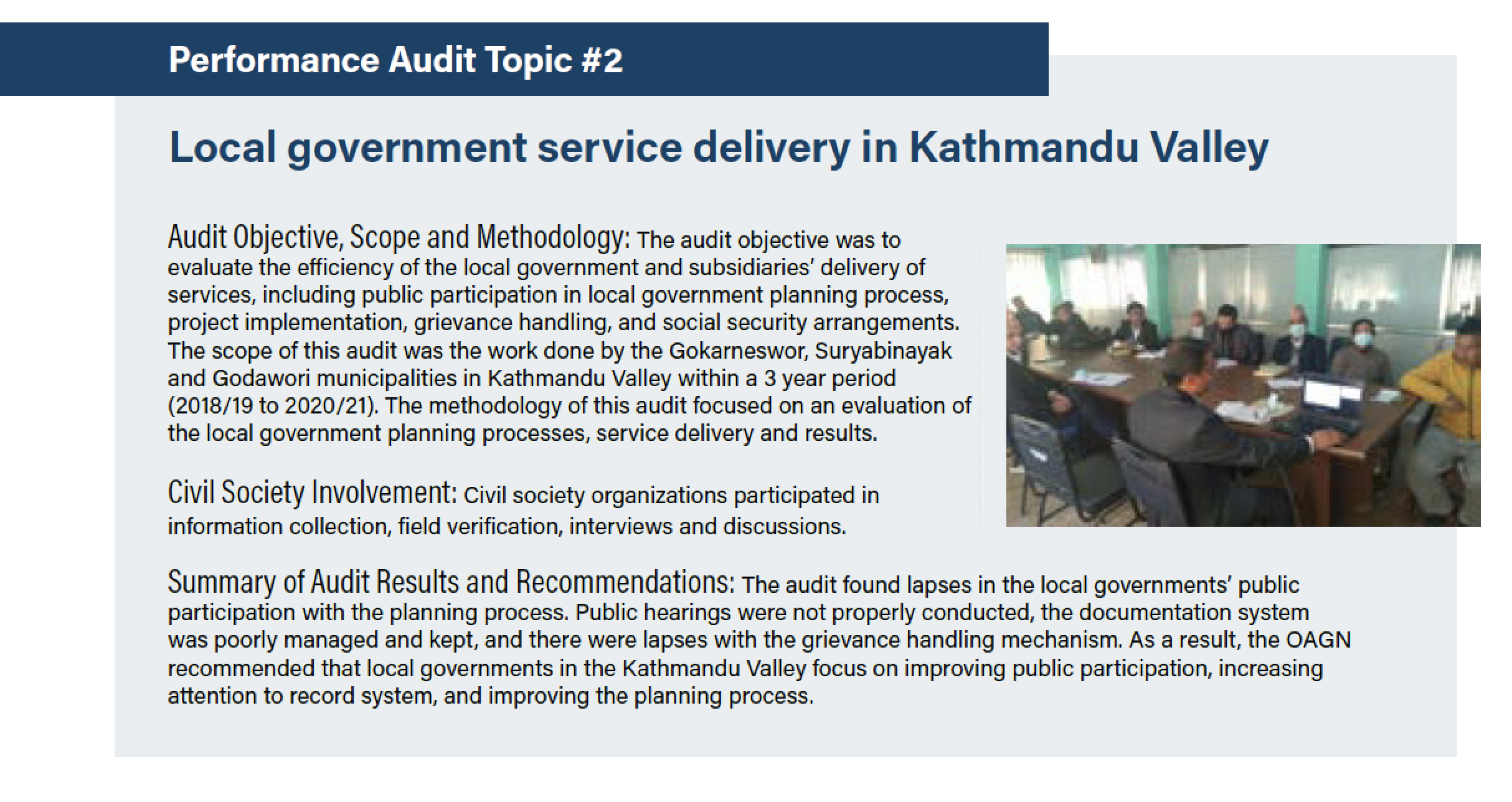
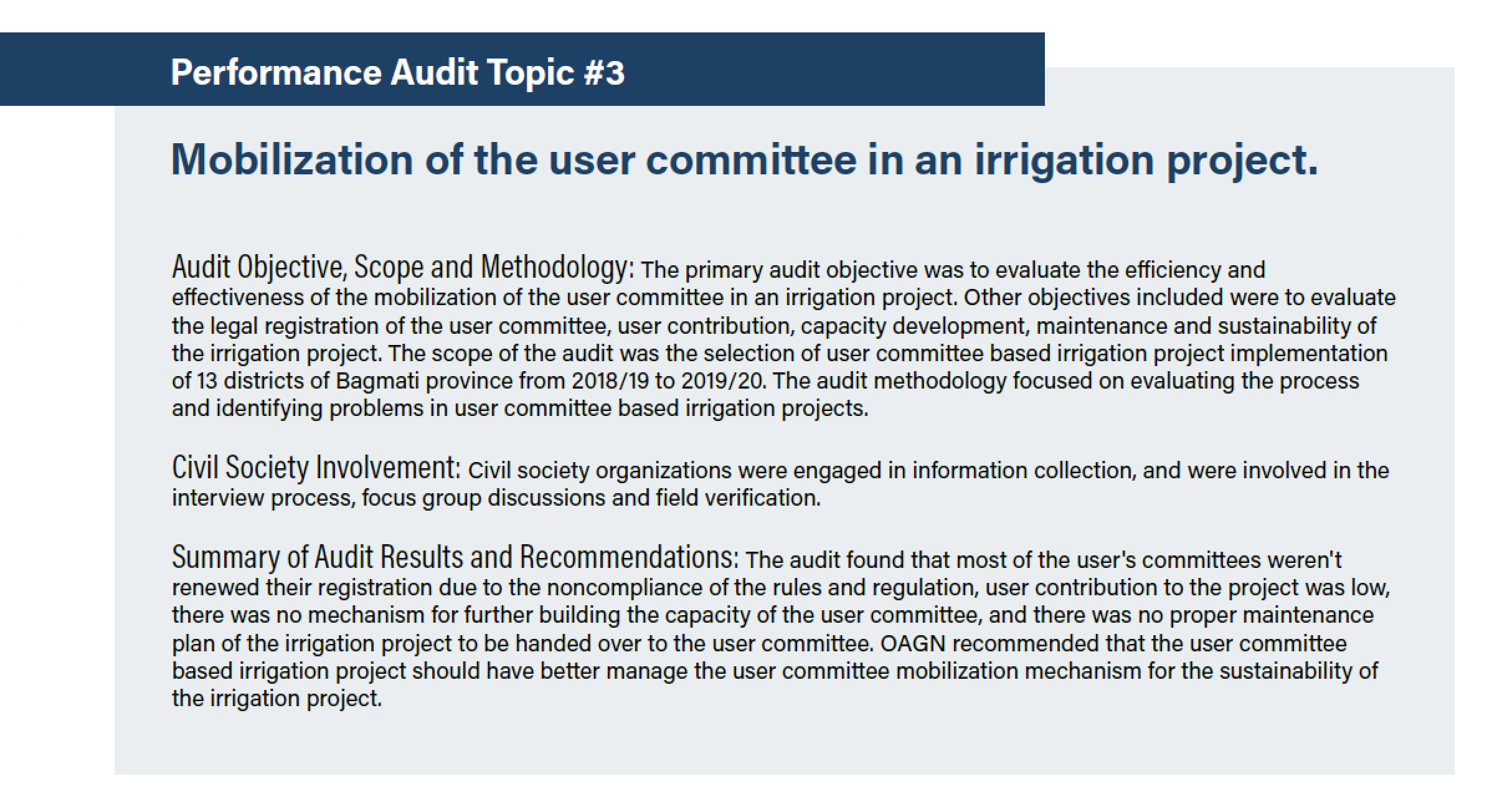
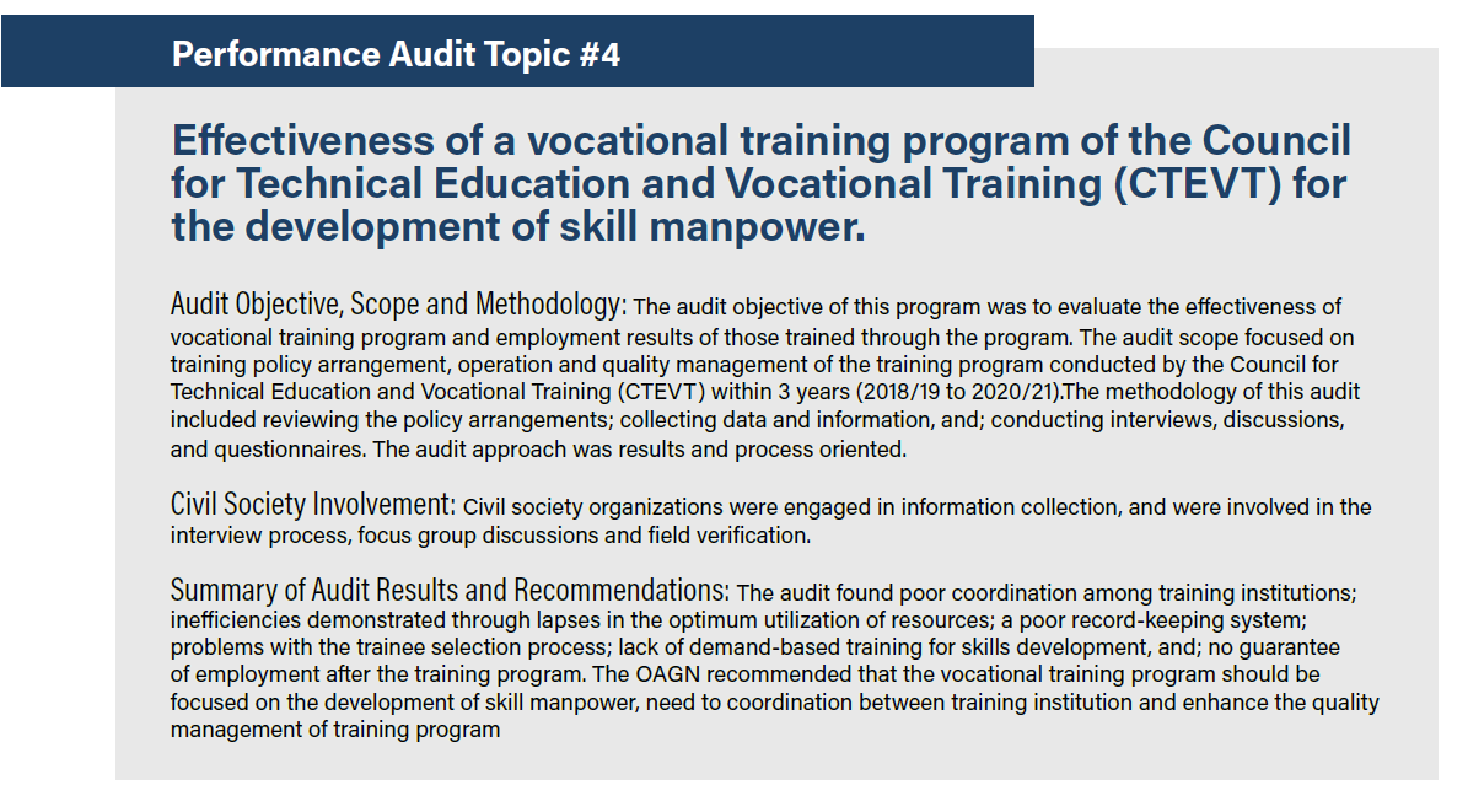
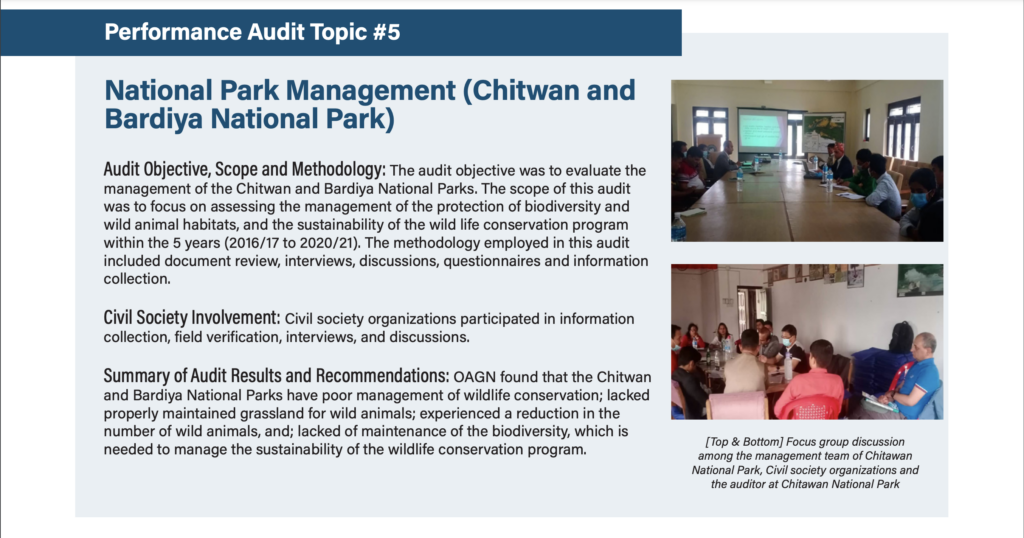
Considerations for the Future:
Although CSOs can make valuable contributions to performance audits, there are considerations to ensure optimal cooperation between CSOs and the audit team. OAGN observed that some challenges of CSOs participation in performance audits included: (a) inactive participation of CSOs, and lack of awareness from citizens regarding the audit; (b) CSOs’ lack of sufficient knowledge on auditing practices, and; (c) potential CSOs and citizen political affiliation linkage, and resulting misleading information. To further promote effective CSOs engagement, SAIs may consider joint-training, sharing of information and lessons learned, capacity development, and a positive attitude toward supporting environment for CSOs participation in performance audit. It is also important to have an agreed upon code of ethics, and clearly defined roles and responsibility for CSOs to enhance the openness and transparency in public audit with due consideration the independence of audit.
Conclusion:
CSO engagement in public audit is relatively new concept for the OAGN, as the CPA procedure was recently initiated and is in a very early stage. CSOs help to make the audit more effective by assisting with the collection of relevant evidence and information. CSOs share information and perspectives regarding the status of services provided by the audited entities, as some are directly involved in the monitoring and evaluation of program implementation at the local level, and thus, have more information regarding local circumstances. There is greater public demand for transparency, accountability and responsibility; the safeguarding of public assets, and; the efficient use of public resources. As seen by the recent results of OAGN’s early implementation of the CPA procedure, engaging CSOs can help improve the quality of audit, and having a reliable source of local level information may enhance accountability and responsibility.





